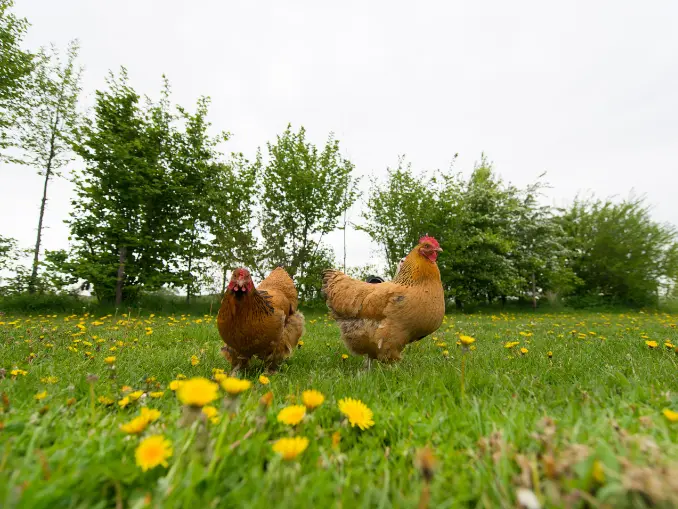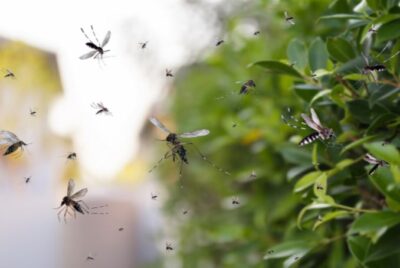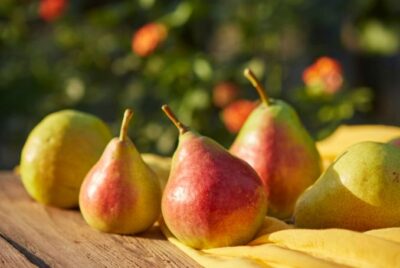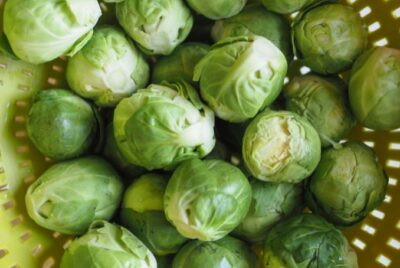Can Chickens Eat Dandelions? Exploring the Benefits of Nature’s Chicken Feed
Can chickens eat dandelions? Absolutely, and they’re even beneficial for your backyard flock. Dandelions aren’t just weeds; they’re a source of essential vitamins and minerals that can bolster your chickens’ health.
This handy guide will dive into the nutritional benefits of dandelions, how to safely introduce them into your chickens’ diet, and practical tips for harvesting and storage—ensuring you can keep your birds pecking happily and healthily.
Table of Contents
All About Dandelions
While dandelions may be a gardener’s nightmare, they’re a chicken keeper’s dream come true! Often considered a weed due to its prolific growth, dandelions are a nutrient-packed green that chickens love to eat.
Want to bolster your flock’s immune system? Look no further than your backyard lawn. Dandelions, with their high levels of vitamins and minerals, can do just that.
The advantages go beyond just health benefits. Feeding dandelions to your chickens can also help you cut down on feed expenses. Why? Because dandelions are a free-range poultry’s best ally. They’re a ready source of accessible greens right in your backyard, supplementing their diet and reducing the need for store-bought chicken feed.
Since incorporating dandelions into our flock’s diet, we’ve observed healthier birds and a more balanced budget.
Identifying Dandelions in Your Yard
Make sure you know how to identify dandelions before you start foraging for them. Dandelions (Taraxacum officinale) are quite easy to spot. They’re known for:
- their bright yellow blooms that pop up in the spring and last until the fall
- their lobed leaves that grow from the base of the stem in a basal rosette
- the milky sap that is released when you break one of the leaves
These common weeds, often considered weeds by many, are also characterized by these features.
Another distinctive feature is the dandelion’s seed head. Once the bright yellow flowers have run their course, they transform into spherical white puffballs. You’ve probably seen these puffballs dotting your lawn or garden, especially if you haven’t mowed in a while. They’re not just a gardener’s annoyance but a sign of a nutritious treat awaiting your chickens.
Nutritional Profile of Dandelions
Dandelions are more than just a pretty plant. They’re a powerhouse of nutrition, packed with:
- Vitamins A, C, K, and E
- Folate
- Minerals such as iron, calcium, magnesium, and potassium
- Fiber
- Antioxidants like beta-carotene and polyphenols
Talk about a superfood that chickens eat for your backyard flock, especially for laying hens! With chickens fed this superfood, which includes egg shells, their health will surely benefit.
There’s more to the benefits though. Ever noticed how the yolk of a farm-fresh egg is more vibrant? That’s partly due to the carotenoid content in greens like dandelions. Including dandelions in your chicken’s diet not only enhances their overall health but also results in richer, more vibrantly colored yolks.
Plus, the calcium and vitamin K in dandelions support strong and healthy bone development in chickens. Who knew that common weed in your backyard could do so much good!
The Versatility of Dandelions as Chicken Feed
The beauty of dandelions lies not just in their nutritional value but also their versatility. The entire dandelion plant, including roots, fresh stems, flowers, and leaves, is edible and can be offered to chickens. You can dig out the plant and let your chickens have a pecking party or chop up the greens and mix them with other feed.
Not just for adult chickens, dandelions are also a great dietary supplement for young poultry like chicks and ducklings, providing them with essential vitamins and minerals right from the start.
However, remember to avoid giving chickens dandelion leaves longer than four inches as they may be tough and less palatable, possibly reducing intake.
Read also: Feeding Flock Favorites: Can Chickens Eat Asparagus Safely?
How To Safely Introduce Dandelions to Your Chickens
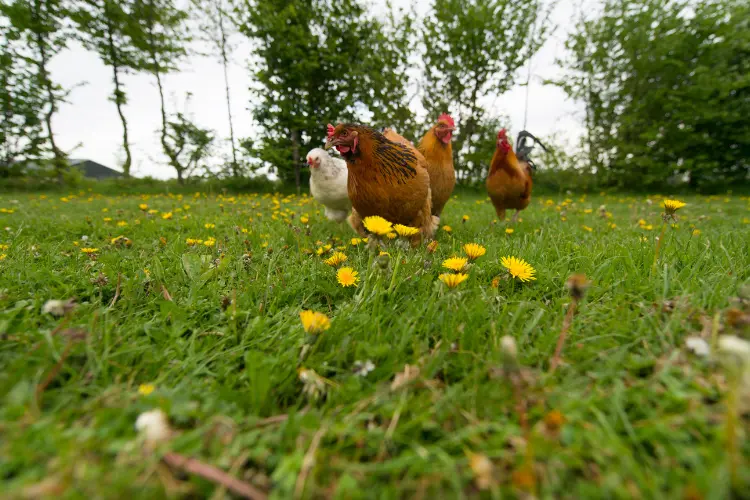
Having understood the benefits of dandelions, you might be keen to introduce them to your flock. But, wait! Like any new feed, introducing dandelions to your chickens should be done safely. The crucial factor is to verify that the dandelions haven’t come into contact with pesticides or other noxious chemicals.
Think about it. The very reason you’re considering dandelions for your flock is their health benefits, right? So, it wouldn’t make sense to feed them dandelions laced with chemicals that could harm them. But that’s not the only thing to consider when introducing dandelions to your chickens. You also need to control the quantity to avoid nutritional imbalances.
Controlling Quantity: How Much Is Too Much?
While dandelions are generally safe for chickens to eat, moderation is key. Contrary to the belief that they pose no overfeeding risks, consuming dandelions in unlimited quantities can lead to nutritional imbalances. This doesn’t mean you need to hold back entirely.
The appropriate quantity of dandelions for your chickens depends on several factors, including the size of the birds, their nutritional needs, and the diversity of their diet.
Regular health checks and monitoring the overall nutrient profile of their diet is critical when introducing dandelions or any new feed element to your birds.
Pesticide-Free Greens: Ensuring Safe Consumption
As stated earlier, it’s vital for safe consumption to ensure that the dandelions are free from pesticides. If you’re picking them from your backyard, make sure you haven’t treated your yard with any chemicals. The same goes for dandelions picked from woods or along roadsides.
If you’re battling dandelions in your lawn and considering using a weed killer, think again. Instead of resorting to toxic chemicals, consider using corn gluten meal. It inhibits dandelion seed germination and is safe for chickens.
But remember, it should not be used in vegetable gardens as it will prevent most vegetable seeds from sprouting.
The Role of Dandelions in Preventing Health Issues
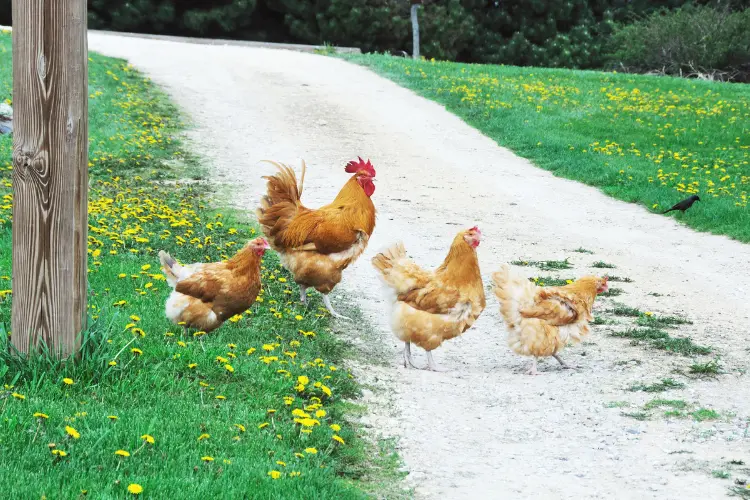
Providing dandelions to your chickens means more than just diversifying their diet. These modest plants have a crucial role in averting health issues. Dandelions offer natural antiparasitic properties beneficial for chicken health.
The ingestion of dandelions helps control internal parasites in chickens, acting similarly to a natural wormer. This means whether your chickens are foraging on the ground cover or munching on dandelion leaves in their feed, they’re accessing the antiparasitic benefits of dandelions.
Natural Detoxification with Dandelions
The health advantages of dandelions for chickens extend beyond their antiparasitic properties. Dandelions also play a crucial role in natural detoxification. Studies suggest that dandelions may protect against liver damage and support liver health.
As a diuretic, dandelions help with the detoxification process of a chicken’s blood. Plus, the potassium content in dandelions contributes to the regulation of blood pressure. It’s fascinating how this common weed can have such a positive impact on your chickens’ health, isn’t it?
Digestive Benefits for Chickens Eating Dandelions
There’s more to the health benefits of dandelions, just when you thought we’d covered it all! Dandelions can support your chickens’ digestive health. They reduce constipation and improve bowel regularity due to their fiber content and prebiotic compounds like inulin.
The roots of the dandelion have several benefits for chickens:
- They are rich in inulin, a type of soluble fiber that supports healthy gut bacteria.
- They can be consumed whole or made into a tea.
- Dandelions have laxative properties, aiding digestion and helping maintain a healthy gut.
So, next time you see dandelions in your yard, remember they’re not just weeds but a natural digestive aid for your chickens to eat dandelions!
How to Harvest and Store Dandelions for Your Flock
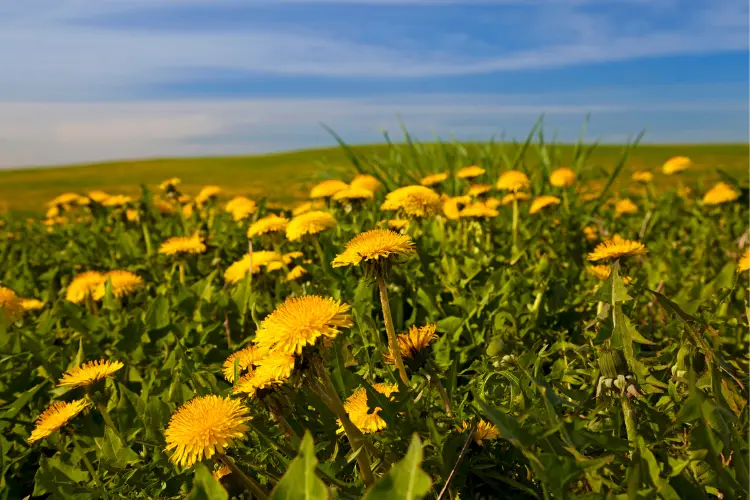
Once you grasp the health benefits of dandelions and the safe way to introduce them to your chickens, you might be curious about their harvesting and storage. After all, if you’re going to make dandelions a regular part of your flock’s diet, you’ll need to know how to preserve them for long-term use.
The good news is, harvesting dandelions is relatively straightforward. And when it comes to storage, with the right methods, you can have a steady supply of dandelions ready to serve your flock, whether it’s spring or the dead of winter.
Best Practices for Harvesting Dandelions
When it comes to harvesting dandelions, timing is everything. Dandelion leaves are best harvested when they are young and tender, as they are easier for chickens to digest. For the flowers, snip them off their stems when they have just blossomed. This is when chickens find them most appealing.
If the flowers are difficult to remove by hand, using kitchen shears can be an effective way to harvest them without damaging the plant.
To ensure a steady supply for your chickens, thin the dandelion plants to about six inches apart. This prevents overgrowth, supports plant health, and ensures that you have enough dandelions to feed your flock.
Storing Dandelions for Long-Term Use
Once you’ve harvested your dandelions, it’s time to store them for long-term use. Dandelions, both their greens and flowers, can be effectively dried using a dehydrator, by air-drying on a flat surface, or in an oven at a temperature below 125 degrees.
After drying, dandelions should be stored in an airtight container in a cool, dark place to maintain their nutritional value and prevent spoilage. Dried dandelions should be used within one year to ensure your chickens receive the maximum nutritional benefit of the preserved plant.
How To Create a Dandelion-Friendly Habitat
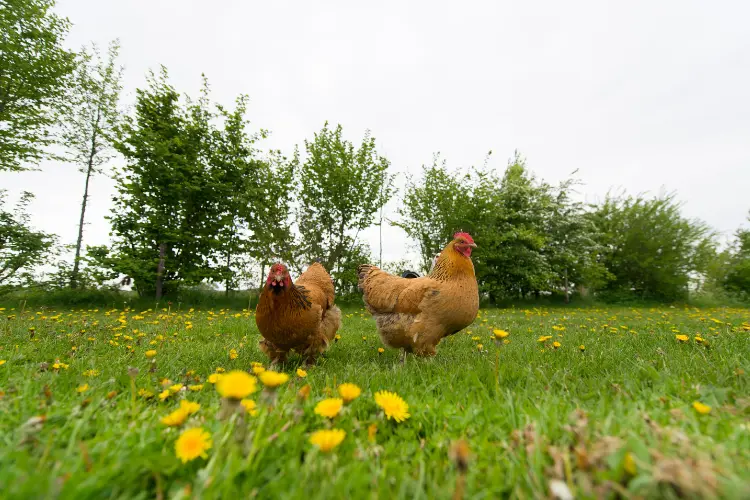
Establishing a dandelion-friendly habitat serves more purposes than just offering your chickens a nutritious snack. It also contributes to a wholesome and sustainable backyard ecosystem. With a few simple steps, you can encourage the growth of dandelions and maintain a balance with other garden plants.
Dandelions thrive in distressed soils better than other grasses. So, repeated mowing of your lawn can actually encourage their growth. Light tilling or disturbing the soil can also help dandelion seeds germinate and grow.
Encouraging Dandelion Growth in Your Backyard
If you’re looking to increase the population of dandelions in your backyard, consider participating in ‘No Mow May’. This allows dandelions to flower and go to seed, spreading their presence naturally in your yard.
Avoiding the use of pesticides and herbicides also helps create an environment where dandelions can thrive. Mild soil disturbance, like the impact of a hoof print, can encourage their growth. Amending your soil with manure and high-nitrogen by-products can enhance the size and growth rate of dandelions.
Balancing Dandelions with Other Garden Plants
While encouraging the growth of dandelions, it’s equally important to maintain a balance with other garden plants. Regular watering is needed for moist soil, but letting the top two inches dry before re-watering can harmonize dandelion needs with other plants.
Incorporating organic matter like compost, manure, or lawn clippings into your soil can dissuade dandelion growth and benefit other garden plants requiring richer soil.
Also, maintaining denser grass and avoiding extremely low mowing can shade out dandelion seeds, thus managing their abundance in lawn areas.
Chickens’ Love for Dandelions: Anecdotes from the Coop
Dandelions possess an allure that chickens find hard to resist. Whether it’s the bright yellow flowers, the tender leaves, or the juicy roots, chickens enjoy eating dandelions. This not only offers them nutrition but also provides them with entertainment.
As chicken keepers, we’ve found our flocks enjoy their foraging time, especially when dandelions are plentiful. We’ve seen improved growth and productive performance in our chickens since we’ve started feeding them dandelions regularly.
Plus, we’ve found feeding dandelions to be safer and more beneficial than using chemicals to remove these plants.
Final Words
Dandelions, often considered a common weed, are a backyard bounty for chickens. They offer a host of health benefits, including boosting the immune system, preventing health issues, and supporting digestive health.
Dandelions are also versatile, can be harvested and stored for long-term use, and are relatively easy to grow in your backyard.
So, next time you see those yellow blooms popping up in your yard, remember they’re not just weeds but a valuable source of nutrition for your flock.

